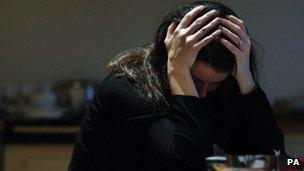Rise in convictions for violence against women
- Published

The Director of Public Prosecutions said more work still needed to be done on domestic violence
Prosecutions and convictions for crimes of violence against women and girls have risen by 15,000 over four years.
The figures come from the Crown Prosecution Service (CPS), which covers England and Wales.
The Director of Public Prosecutions (DPP), Keir Starmer, said the rise was due to better training and a greater understanding of victims.
The Refuge charity welcomed the increase but said it represented only "the tip of the iceberg".
Most victims of domestic violence suffer in silence - Mr Starmer said a woman would on average be assaulted 30 times before she sought help.
In a speech he will highlight the progress he believes the CPS has made when it comes to all violent crime against women and girls.
The DPP will tell his audience that last year in England and Wales there were 91,000 prosecutions and 67,000 convictions.
The CPS launched its Violence Against Women and Girls Strategy in 2008.
It focused on a number of issues including domestic violence, rape, forced marriage and female genital mutilation.
Four years on with an increase in both prosecutions and convictions, Mr Starmer told the BBC: "I don't want to overclaim this.
Director of Public Prosecutions Keir Starmer: "There is still a significant problem in terms of encouraging people to come forward"
"There are many women who do not have the confidence to come forward. And we must continue in the work we are doing to try and give them the confidence. But this is perhaps a milestone in the journey we are on to try and prosecute these cases."
And he outlined the CPS approach: "The main planks of our strategy have been absolutely clear policy and guidance for our prosecutors dealing with, for example, victim issues - why might a victim not want to see a case through or want to withdraw?"
He highlighted better training and use of specialist prosecutors, adding that "we have really tried to address myths and stereotypes which have bedevilled the criminal justice system for years. We have confronted them head on."
Mr Starmer acknowledged that some victims who had come forward had been let down and traumatised further because of shortcomings by CPS staff.
Cases have collapsed and suspects have walked free because of incompetence by prosecutors.
He said: "I don't pretend for one minute that we haven't made mistakes in the last few years.
'Barely scratch surface'
"We are a huge organisation, we prosecute about a million defendants year on year. There will be errors.
"My job is to reduce the number of errors and deal with them honestly when we get them and that means looking into why something went wrong and apologising when we get it wrong."
The CPS has 3,000 prosecutors specially trained in dealing with domestic violence cases and 800 trained rape specialists.
When it came to the conviction rate in England and Wales for domestic violence it was 73% but for rape it was lower.
The CPS said there was 62.5% rate where a suspect had been charged with rape and was convicted of rape, a serious sexual assault or a crime of violence. The conviction rate for rape alone was 40%.
Cases unreported
Sandra Horley, chief executive of Refuge, said: "In London alone there were almost 52,000 domestic violence offences recorded in one year, so the 66,860 cases successfully prosecuted nationally barely scratch the surface.
"We are concerned that the British Crime Survey tells us that there are an estimated 1.2 million women who experience domestic abuse each year in the UK.
"Some of these cases may not be reported to the police for a number of reasons, including women being too frightened to come forward.
"This leaves a huge number of domestic abuse cases that never reach the police and therefore the courts.
"For those who do report domestic violence the police response is often woefully inadequate."
Victim Support welcomed the rise in prosecutions and convictions but said it still had "serious concerns" about the number of women not reporting crimes or seeing their cases through in court.
"Victim Support helps women move on from the trauma of violence every day - often when they have not reported the crime to the police because of fear, or lack of confidence in the justice system itself," chief executive Javed Khan said.
"The challenge for the Crown Prosecution Service is to make sure all women who have been the victim of a violent crime can see justice done."
Murders
Dr Aisha Gill, a reader in criminology at the University of Roehampton, also welcomed the report, but said the surge in prosecutions was "merely a drop in the ocean - especially as we still need to address the root causes of violence against women".
She said the CPS had been a "leader" in prosecution, but warned that the "statistics do not always tell the full story".
"We know that one in four women are affected by domestic violence in their lives. There are over two murders a week in relation to domestic violence."
Dr Gill added there had been significant responses to rape, but "more work" needed to be done "in terms of provision, prevention and protection".
- Published11 June 2012
- Published25 April 2012
- Published24 April 2012